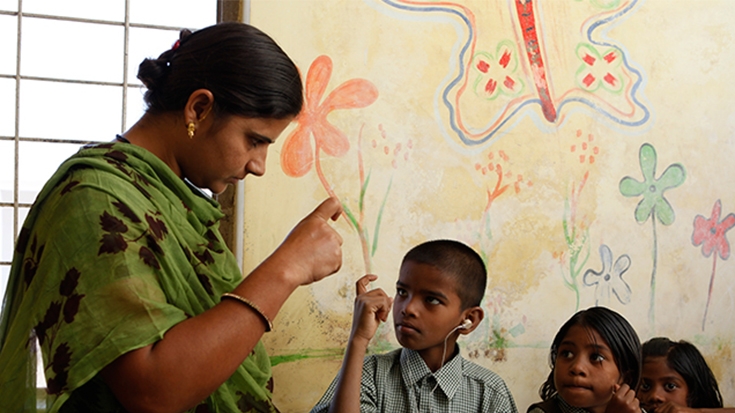What is corporate social responsibility?
Corporate Social Responsibility (CSR) is often defined as corporate responsibility, corporate citizenship, social enterprise, sustainable development, triple-bottom line, corporate ethics, and in some cases, corporate governance. What binds these terms together is the expectation that corporates (private and public enterprises alike) behave ethically vis-à-vis a broad group of stakeholders - workers and their families, communities and the wider society.
In India, as in many other countries facing similarly large development challenges, the discourse around CSR is increasingly about the crucial role corporates can play in bringing about positive change in the area of human development and social inclusion. CSR is no longer seen as corporate social assistance or philanthropy, but as essential to a good business strategy, helping reduce investment risks and enhancing business profits by improving transparency and accountability. It is about working together - with government, with civil society, and with the community - to improve the lives of millions of people by making growth more inclusive.
What is the World Bank doing?
The World Bank seeks to strengthen the collaboration between corporate business strategies and national development priorities by supporting the Government of India’s Ministry of Corporate Affairs (MCA) in its efforts to develop the CSR activities of corporate enterprises. World Bank support is channeled through the Ministry’s Indian Institute of Corporate Affairs (IICA) for the private sector and the Department of Public Enterprises (DPE), Government of India for state owned enterprises.
The main objective of the World Bank’s support – in the form of ongoing technical assistance - is to foster an enabling environment for the corporate sector to work towards social inclusion and the achievement of the Millennium Development Goals in partnership with government, non-government organizations, civil society organizations and communities. The cornerstone of this assistance is the World Bank’s ability to facilitate the sharing of best international practice - from both developing and industrialized countries - to inform India’s growing CSR agenda. Key areas of engagement include: analytical activities, institutional design, shareholder consultations, capacity building and knowledge sharing.
Building institutions and capacity
World Bank support has helped the Indian Institute of Corporate Affairs (IICA) to establish the National Foundation for CSR (NFCSR). Ongoing capacity building efforts are helping to structure NFCSR activities and, more broadly, to strengthen its ability to play an independent catalytic role in coalescing and bringing together CSR players and stakeholders to address India’s most pressing development goals. The World Bank is also engaged in helping the Department of Public Enterprises to develop an independent institutional structure to facilitate the CSR work of state owned enterprises, or public sector enterprises (PSEs) as they are referred to in India.
The First Roundtable on CSR was held in collaboration with the Harvard Business School in Mumbai on March 10th, 2012, where private sector companies and large PSEs participated. Three on-line learning events were organized - on CSR, Business Ethics, and Human Development - in collaboration with the University of Pennsylvania’s Wharton School of Business and with Japanese companies, Japan NGO Center for International Cooperation (JANIC), and the Japan International Cooperation Agency (JICA). Two workshops were organized in November 2012 jointly with FSG, a Boston-based nonprofit consulting firm that partners foundations, corporations, nonprofits, and governments across the globe to develop effective solutions to the world’s most challenging social issues. The firm is headed by Michael Porter and Mark Kramer. The workshops aimed to train Indian corporates (private and public sector) on the concept of Creating Shared Value - in other words, innovative management thinking concerning the relationship between business and society. The first annual Michael Porter Prize for CSR in India for 2012 was also supported by the World Bank in collaboration with the IICA. The award recognizes the well-performing CSR work of companies. Work is ongoing to develop an Executive Development Program together with the Harvard Business School.
Going forward
The Government of India’s recent Companies Bill is a significant development in the country’s efforts to move forward on the CSR agenda. Formulated by the Ministry of Corporate Affairs, the Bill places human development front and center of the CSR agenda and specifies that it is an important area for corporates that warrants Board-level leadership. Under the Bill, all profit-making companies will be required to spend two per cent of their average net profit of the previous three years on CSR activities. The norm is valid only for companies with net worth of Rs.500 crore or more; or a turnover of Rs.1,000 crore or more; or a net profit of Rs.5 crore or more, during the previous three financial years. The National Foundation for CSR (NFCSR) will take the lead on CSR work by creating advocacy and capacity building platforms. The NFCSR will also develop reporting guidelines on CSR in light of the new Bill.
The discourse around CSR is moving strategically towards social inclusion and human development. The World Bank is helping the MCA and the DPE in undertaking initiatives in this regard.

